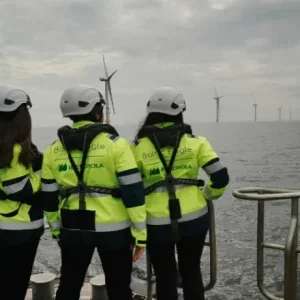
This unique technology, designed by Russian scientists from National Research Center “Kurchatov institute”, allows to extend reactor service life by using heat treatment that recovers physical parameters of the metal in a reactor vessel.
The project opens up cost-effective life-extension opportunities for the fleet of aging 1GW installed capacity reactors across the globe.
ROSATOM CEO Alexey Likhachev said: “Today, there are about 37 VVER-1000 around the world. Annealing [of a reactor vessel] is the new and, currently, only technology in the world that allows to extend the service life of a reactor. This technology will be available for export”.
Annealing could extend the service life of VVER-1000 by 15-30 years, thus helping to prevent up to 7.8 billion tons of global CO2 emissions in total, as well as boosting the safety and economic performance of nuclear power plants.
It is estimated that, for the extended operational lifetime, the cost of power generation (so-called LCOE) could decrease to as much as $29 per MWt-hour, which is cheaper than the marginal cost of coal-fired power generation.
NRC “Kurchatov Institute” president Mikhail Kovalchuk said: “The long-term operation of VVER-type reactors under neutron irradiation leads to the degradation of the metal properties in reactor pressure vessels. This limits the lifetime of the whole NPP.
“Scientists at NRC “Kurchatov Institute” have developed and patented the VVER-1000 nuclear reactor vessel’s recovery annealing technology, which can be adapted for water-moderated nuclear power reactors of any design and capacity. The pilot recovery annealing of the 1st unit of the Balakovo NPP vessel was carried out in mid-November.
“It led to the recovery of the structure and mechanical properties of the pressure vessel metal to its original state. According to the annealing results, this VVER-1000 reactor pressure vessel received an additional 15 years of service life”.
Previously, similar technology was tried and tested at smaller reactors of medium capacity (VVER-440) at Novovoronezh and Cola NPPs in Russia, Rivne NPP in Ukraine, Armenian NPP, Greifswald NPP in Germany and Kozloduy NPP in Bulgaria. Annealing allowed to extend their life cycle from 45 to 60 years.
The VVER-1000 vessel is larger in diameter and has thicker steel inlayings in comparison with VVER-440 vessels. So, scientists from the Kurchatov Institute have developed a brand new technology for the annealing of a vessel of a large-capacity reactor.
The metal in the reactor vessel was slow heated to a temperature of +565 degrees Celsius, after which it began a stationary annealing, which lasted 100 hours. Then, the metal was slowly cooled.
All the technical data gathered during the procedure will be compiled into a report that will be submitted to the national regulator (Rostekhnadzor) for approval, to conduct further reactor operations.
Source: Company Press Release






